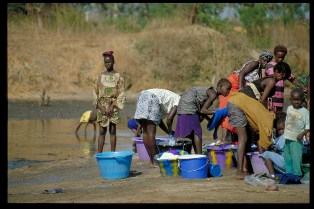If stakeholders set the goals, projects are sure to address their top priorities. Project beneficiaries who are involved in decision making throughout the project are likely to take responsibility for sustaining and expanding change after the project finishes. Communities, municipalities, and governments, through democratic participatory planning and management, can best identify what is wrong with their water management and how to fix it.
Recognise that people are the owners, actors, and direct beneficiaries of water projects
Technical institutions, nongovernmental organizations, and donors should work with the principal stakeholders to define problems, identify collective solutions, and provide training in negotiation, conflict resolution, monitoring, and other skills needed for successful water management with lasting change. They must remain in a supportive role.
In all projects, WANI seeks to integrate local people into the decision making process because it increases the project’s effectiveness and sustainability. It ensures change over the long term and makes ongoing watershed management more relevant and more successful.
Projects: Basim, Himal – Hindu Kush Mountain Ranges, Mekong River Basin, Tacana Project
Stories from the field:
- Chiapas fish farm – Farmers in Chiapas, Mexico collectively establish a fish farm to revitalize their economy
- Replanting faith into the river banks – In Burkina Faso, villagers along a drying river identify their needs as fisheries, fuel wood, food, and a salable commodity. Planting trees, including mango trees with exportable fruit, along the river may also recharge groundwater and restore the fishery
- Villagers regains authority by re-storing their water – IUCN helps Ghanaian villagers take ownership of and provide maintenance for the Sakom Dam after it burst, destroying their livelihoods.
- Giant catfish festival – Giant Catfish Club members in Thailand turn an annual hunt into a festival to allow recovery of the overfished species.
- Small budgets - Big plans – Locals tenaciously push their plan for Tanzania’s Pangani River basin for three and a half years before attracting funding.
- Attapeu health, nutrition and wetlands conservation – A nutrition program in southern Laos makes villagers realize they must protect fish breeding grounds if they are to maintain their food supply
Related WANI Toolkits:
NEGOTIATE: all chapters
PAY: Chapter 3, "Designing a Payment Scheme", Chapter 4 "Roadmap towards Agreement"
RULE: Chapter 4, "Public participation and civil society organizations"
SHARE: Chapter 3, "Stakeholders in Benefit Sharing and the Management Process"
